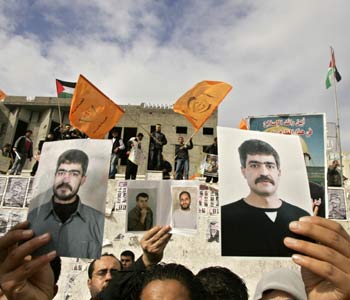
Families of jailed Palestinian prisoners in Israel hold pictures of their sons during protest in Gaza (R)
JERUSALEM (AFP) -Deputies were expected to complete the process of dissolving Israel”s parliament, paving the way for early elections after Prime Minister Ariel Sharon”s dramatic decision to split from his right-wing Likud party.
Eight preliminary dissolution motions were overwhelmingly approved on Monday, meaning elections should almost definitely take place in March without President Moshe Katsav having to act on Sharon”s request to order the 16th Knesset”s termination, otherwise due in November 2006.
Sharon will lead his new National Responsibility party into the election, having made peace his chief goal and warning that pullouts from the West Bank cannot be ruled out in a final status agreement with the Palestinians.
The premier”s divorce from Likud had been on the cards for months, with many members refusing to forgive him for presiding over September”s withdrawal from the Gaza Strip, Israel”s first pullout from occupied Palestinian territory.
Having persuaded around a dozen Likud MPs to join him on his political adventure, Sharon issued a withering broadside at the hardliners remaining in the party he founded more than 30 years ago.
"Staying in Likud means wasting time in political squabbles rather than acting on behalf of the good of the country," he told a press conference late Monday.
"Israelis did not choose me just to keep the prime ministerial seat warm."
The centre-left Labour party cleared the way for an early election by voting Sunday to pull out of the government, ending a 10-month coalition that allowed Sharon to push through the withdrawal of troops and settlers from Gaza.
The decision to quit the governing coalition came after new Labour leader Amir Peretz, who trounced veteran politician Shimon Peres in a leadership vote, said the party should stop propping up the current regime.
In talks last week, Sharon and Peretz agreed in principle that elections should be brought forward from November 2006 to either February or March.
In the Likud camp, six senior members have already publicly or privately indicated they want to take the helm — including Sharon”s arch rival, former prime minister Benjamin Netanyahu, who is overwhelming favourite.
At least four Likud cabinet ministers, including Finance Minister Ehud Olmert and Justice Minister Tzippi Livni, have already agreed to join Sharon although Defence Minister Shaul Mofaz has decided to stay put.
One minister from the Labour party, Haim Ramon, has also agreed to sign up.

Israeli Prime Minister Ariel Sharon gives a press conference at his office in Jerusalem (AFP)

Israeli artillery fires from a base along the northern border with southern Lebanon on Monday (EPA)
